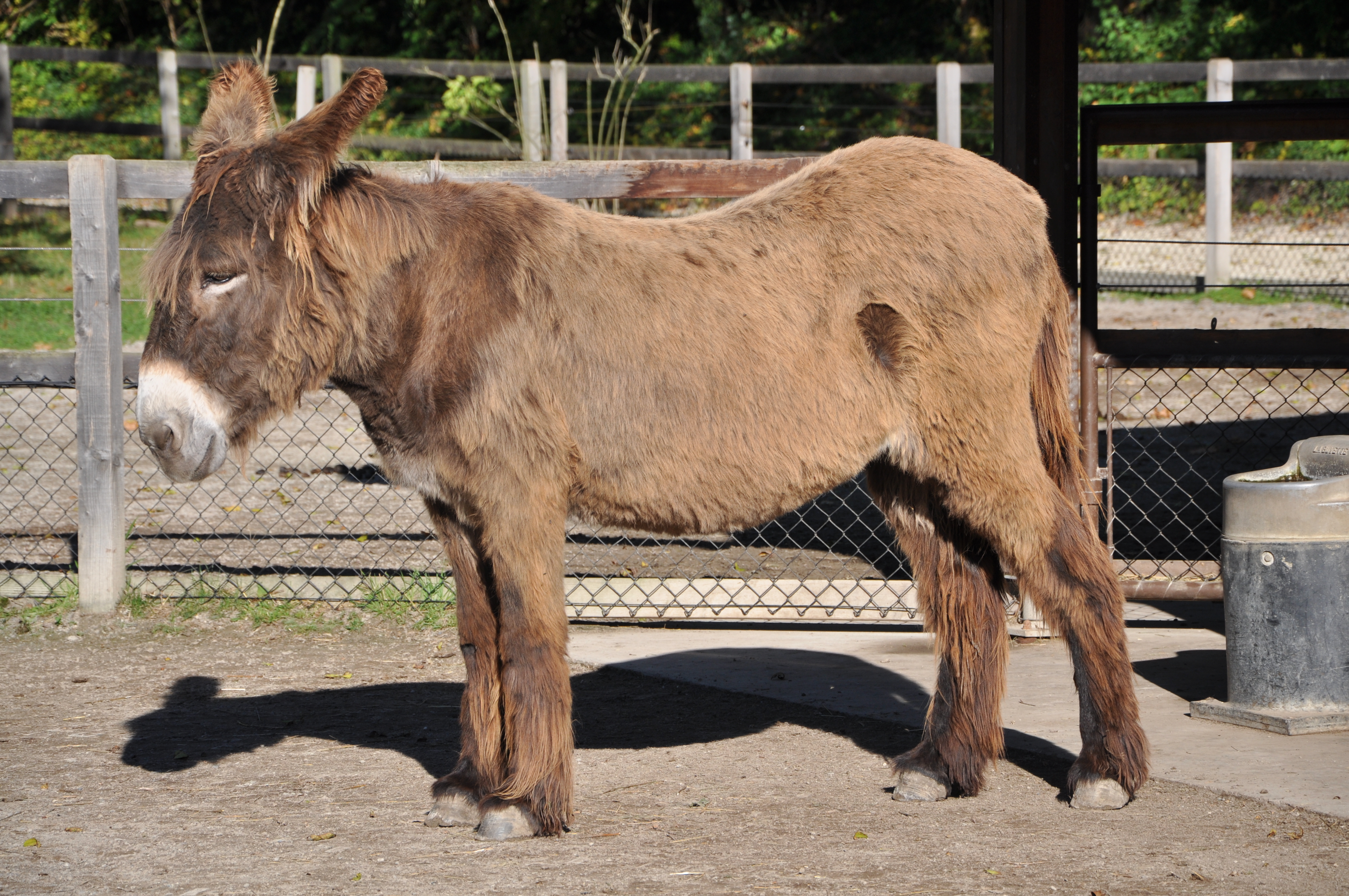
RARE BREEDS TRUST OF AUSTRALIA
powered by TidyHQDonkeys: Poitou Donkey
Donkeys: Poitou Donkey
Country of Origin
France
Australian Status

International Status
Endangered
- 2020 Jeanette Beranger of the Livestock Conservancy in the USA did the first census in decades, finding less than 70 in the USA and less than 500 globally.
- 2015 FAO (Food and Agriculture Organisation) of the United Nations has numbers at 515 breeding age females.
Distribution
France, USA, UK, Russia, Australia.
Uses
Once popular to pull canal boats in France. Also various draught uses, transport, riding.
Breed traits
A large breed known for its shaggy coat, often it hangs in ringlets in winter. Those with black coats have genuine black wool, the same as black alpacas, the only two animals with pure black wool. The wool can be spun.
History
In France, their country of origin, the name is Baudet du Poitou - Donkey of Poitou. An ancient breed going back to Roman times, from the Poitou region of France about 300 miles south west of Paris. Described thoroughly in a Royal document of 1717. The studbook started in 1884.
Due to their big size they were very popular for breeding mules, throughout history up to and including WW2. Then numbers plummeted from tens of thousands to only 44 animals by 1977. Fertility had declined alarmingly - up to 73% fertility failure, as well, a third of foals died after birth - hence registrations dropped to almost nothing. The French government stepped in and started a scientific breeding program which included some upgrading - by 1995 under careful supervision, numbers had grown to 200 animals.
History in Australia
Poitou Donkeys came to Australia in the nineteenth and twentieth century - but not being kept pure, disappeared when mechanical transport evolved. Australia imported several large donkeys mostly for breeding mules including from Chile, Spain (Catalonia), France and the USA.
several large donkeys mostly for breeding mules including from Chile, Spain (Catalonia), France and the USA.
Some examples of early importations of Poitou are:
- 1861: a Poitou jack in Melbourne at the firm Henderson and Co, recently imported by Mr Wilson for breeding mules, they also had a white Hadji donkey from Mecca he imported, described as graceful.
- 1876 in early January or possibly late December '75: a Poitou jack arrived from London to Sydney on the ship Subraon, along with two Catalonian jacks.
- 1876 in February: a Poitou jack arrived in Melbourne, sent by Mr Cane from Poitou to Mr Fry of Wendouree, Victoria; his name was Monsieur Froggy, he was for breeding mules.
- 1890 in June: the arrival of a jack in Sydney for the Colonial Sugar Company for mule breeding, it was shipped by Frad Parbury from London. Australians going to France and Spain for donkeys, invariably shipped them to the UK to come here as we had regular trading ships from there.
- 1905: the Durack family imported two jennys and a jack from Poitou (probably via the UK). They were taken to the Kimberley W.A. to their property Behn Ord, and crossed to Australian donkeys to add some height and draught and to cart mares for mules; in 1915 good results reported.
More recently some were imported from America in the 2000's, a jack and a jenny in foal and possibly two first crosses (or crosses were born after arriving here).
An embryo was transplanted into a Standardbred mare by Dr. Angus McKinnon, it was a successful pregnancy, and a Poitou foal was born; this was done at Monash Uni, the foal born in January 2002 and named Quasar - a jenny foal. At the time news reports said it made three Poitous in Australia. The donor jenny had leg problems and could not give birth according to reports of the time. Donkey embryos put into mares abort 70% of the time so it was a fortunate birth. The donor parents were the jack and jenny Poitous owned by Ron and Dianne Condon of Yarra Glen, Victoria, which had come in from America.
Australian population
2023 - three total, being two jennies and one jack.
Breed Organisations
Donkey All Breeds Society of Australia Inc.
Affiliated Donkey Society of Australia
Additional Notes
The university of Illinois in the USA studies donkey genetics, and has a small herd of five Poitous. They have a breeding program that includes upgrading.
Photos
Top. A Poitou Donkey from Wikimedia Commons.
Bottom. Poitou donkey at the Tierpark Fasanerie Groß-Gerau from Wikimedia Commons
